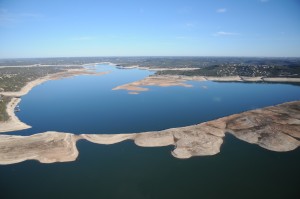Few Satisfied With New LCRA Water Plan

Photo by LCRA
The extreme drought has lowered levels in Lake Travis to the point where rice farmers downstream may soon be cut off.
Who deserves water more? The first one in line, or the one who stands to lose the most financially if it’s taken away? That’s one way of looking at the ongoing “water war” on the Lower Colorado River between rice farmers in Southeast Texas and residents and businesses along the Highland Lakes upstream from them. Caught in the middle? The Lower Colorado River Authority (LCRA), which manages the water in the lakes. Today they are voting on a water plan that would change how water is managed on the river.
The plan would add a second cutoff date to determine whether there’s enough water for rice farmers downstream, which would likely mean more years without water from the lakes for the farmers. The farmers will likely not get water this spring because of low lake levels. “In the future, farmers will have to grow more pounds per acre on more marginal land, it looks like with less water,” longtime rice farmer Billy Mann testified during public comment on the plan Tuesday. “Can we do it? We’re going to have to, but hopefully we will have the water there for us.”
Residents and businesses on the Highland Lakes have been pushing for changing how water is used and paid for on the Lower Colorado. “I got to tell you, it’s really hard for me to be speaking here today, because we are staring down the devastation of the drought of 2011,” Janet Caylor of the Central Texas Water Coalition said. “And as y’all are aware, there have already been multiple bankruptcies, loss of jobs; many are struggling to stay in business.”
The new plan represents compromise and sacrifice on all sides, but no one seems very happy with it. The plan took 18 months to put together and was created by a 16-member committee with representatives from the rice farming industry, municipal users, and Highland Lakes businesses, residents and environmentalists. But after that plan was formed, several amendments were made by LCRA staff that left the Highland Lake contingent feeling left out of the process.
“We felt like we had give a lot to come to a consensus,” said John Williams, an owner of the Thunderbird resort on Lake Buchanan. “Later on we hear that other meetings took place that we weren’t involved in. That was disappointing.” Those changes move the cutoff point for the second release of water to rice farmers from 1.2 million acre-feet to 1 million acre feet. Essentially it means that there will be fewer years of the second water release being cut off.
Lake residents and businesses are asking the LCRA board to approve the original water management plan without the amendments, but that appears unlikely.
The LCRA board is expected to vote on the new plan this morning.




